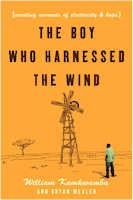"I try, and I made it."
Sunday, July 1, 2012
The Boy who Harnessed the Wind
Friday, November 27, 2009
The Outliers
I'm not quite sure how to classify Malcolm Gladwell's books - business, sociology, self-improvement? - but they definitely make for interesting reading.
This book deals with success, or rather the contributing factors to success. In a way, he demystifies the concept of sheer outstanding talent, and highlights instead the importance of opportunities, circumstances and even family background.
What I found interesting was his acknowledgement that certain races (Chinese, Jewish) are more successful in specific industries or activities, but that it has nothing to do with genes. Instead, it is the result of cultural traits shaped by such things as geography and history.
I found it relevant to support the current industrial need for capability development, especially the 10,000 hour rule (the minimum amount of time you need to spend practising something to become an expert in that area). Assuming it's your full time job, at 40 hours a week, that'll amount to almost 5 solid years before becoming a specialist.
The Tipping Point
This book talks about creating and spreading change as epidemics - mostly in a socio-cultural context, but he also draws references from the spread of diseases. Pretty interesting stuff, with a lot of case studies ranging from history, children's television, smoking and crime.
Ultimately, it boils down to 3 main factors:
- The persons involved - Connectors, Mavens & Salesmen
- The form of the message - Stickiness Factor
- The environment - Power of Context
Item 1 explains the 3 different types of personality that you need in a Change Agent - they must either have a lot of contacts (Connector), a lot of information (Maven) or a lot of enthusiasm (Salesman). Sometimes a Change Agent may be a combination of two or all three.
lThe second issue deals with the nature of the message, and here the book shares different strategies that one can use to make the message more appealing and sticky.
Lastly, change can only stick if the environment allows it - a horseman riding through the night, for example, is more memorable than one riding in broad daylight.
All in all, it kept me hooked - and that's a lot to say for a piece of non-fiction. I'd make this compulsory reading for those working in Change Management. And also for parents with very youn children.
